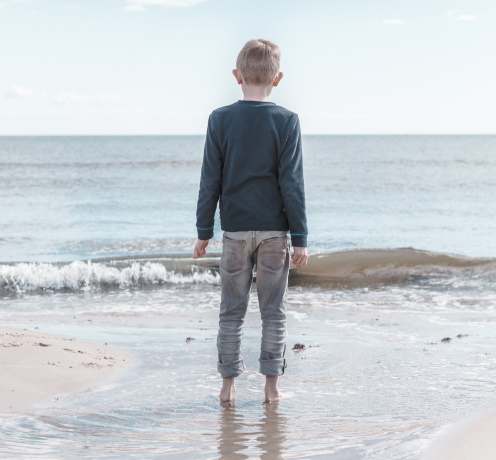
Community Submission by: Anonymous
I recently watched the movie “Lady Bird.” If you haven’t seen it, it’s the story of the relationship between a rebellious teen and her mother. I wouldn’t have normally resonated with this type of plot, but recently, my 11-year son and his hormones have been ruining my life (hormones + autism = horrible combination).
So when the mother, played expertly by Laurie Metcalf, basically kicked her daughter out of the house, I was cheering from afar! YES! Don’t let that brat win! You go girl!
But then came a scene that took my breath away.
After making a few wrong decisions, Lady Bird finally calls her mother for help. And there is a scene where Lady Bird asks, “Do you like me?”
And the mother asserts, “Of course I love you.”
And Lady Bird responds, “I know you love me. But do you like me?”
The mother remains silent, and her face says it all.
What Lady Bird is asking in this scene is not about forgiveness after making life-ruining decisions, but rather is asking her mother, someone whose opinion it turns out she actually cares about, whether she “likes” her. What she is truly asking is, Can you stand to be around me? Am I a good person? Could you be my friend?
This struck a nerve recently as my son’s behavior has taken a turn for the unbearable. Stims are at an all-time high, there’s been regression, and this mama is tired. Every single time he makes a bad decision (and he knows it), he asks, “Do you still love me?”
My answer is always that of course I do, that no bad behavior will ever make me stop loving you. The unsaid subtext here is, of course, but I don’t like you very much right now.
What if your child is a jerk?
And this has always led me to unspeakable guilt. How can I not like my child?
I was never going to be a great mother. This isn’t a pity party. It’s just that I never saw myself as the maternal one. I didn’t even want children right away and only agreed to get pregnant once. But I imagined that he would grow up, and we would tell each other everything over steaming cups of hot cocoa. I imagined that he would share a love of literature, music, and theater and that we would always enjoy each other’s company.
But fate is a cruel mistress. So I get pregnant, and then what? Here we are, given a child, and we have no way of knowing who they are going to be. We are supposed to love them unconditionally for our lifespans and theirs.
But no one talks about the elephant in the room: What if your child is a jerk? What if he’s violent? What if you have nothing in common?
You might admire someone for one thing they did right but lose that admiration when they do something wrong.
Guess what? You still love that child. But you have to reconcile in yourself how to love someone that constantly brings you down and that you don’t like. And that is what I am having trouble doing.
My son and I have nothing in common. He likes video games, and I like books. He likes repeating things over and over, and I am fine just doing them once. I like food, and he refuses to eat. It is hard for us to come to a mutual place of “like.”
But I still love him. Even when I refuse to play video games and he calls me a name, I still love him. I will still fight to the death for his IEP or with his doctors. I will defend him with all my power, teach people to be inclusive, speak highly of his (sometimes irregular) positive attitude and love of people.
Saying all that, how can I not like him, right?
In reading up on the concept of “like” versus “love,” I found some interesting parallels into our lives. Here are some of the ones that resonated most with me:
Like means admiration, but love means acceptance and endurance, come what may.
I do admire my son for his strength through his adversities. But admiration is a fleeting thing. You might admire someone for one thing they did right but lose that admiration when they do something wrong.
My husband and I just came to terms with […] what our son’s life will look like in the future […]
But love, love is accepting that person, flaws and all, and enduring. This journey is all about endurance. Doctor’s visits, behavior challenges, sleep issues – the list keeps ongoing with no end in sight.
My son has cyclical development, where he rises and rises like a spiral and then regresses a few years of development before rising again. We are in the midst of a pretty big regression, and it pains me to see my pre-teen behaving like a toddler again. We had made so much progress in the last three years that I cry over the three months he’s lost most of it. I know from experience he will rise again, but when? I must endure until that point, and through all rises and falls from this point forward. My endurance keeps my love for my son strong, which is important as the journey continues. So maybe I don’t need to admire him; I just need to accept him and endure his journey.
Love understands that we are all autonomous beings seeking our individual fulfillment, which may not perfectly align to your vision.
Oof, this is a doozy for me. My husband and I just came to terms with the fact that our vision of what our son’s life will look like in the future is wildly different than our likely reality. Our son likely won’t be able to go away to college; he likely won’t be able to separate from the home; he may not be able to find a reliable partner.
But I certainly don’t tell my son that! When he says he wants to be a doctor, I encourage him. When he says he wants to be a cashier at a grocery store, we talk excitedly about what that might entail.
This is love.
His journey is not my journey.
He will want and do things that are not in my original plan for him. And my role, however sad that might be, is to continue supporting him on that journey to the best of my ability without judgment. Do I like this role? No, I hate it. But my love for him should make it so that I continue to provide for him until he is fulfilled…not until I am.
I hate this, and sometimes I think this is why I don’t like him very much.
In infatuation (a form of “like”), when one hurts the other, the trauma pulls apart the relationship. In love, each sees the trauma as the catalyst for deeper understanding.
Our son’s birth story is traumatic. I actually have PTSD from his birth that I am still dealing with 11 years later. I hated myself for a long time for putting him through it, and I hated him for a long time for changing how I view motherhood.
But this is why it is important to love your child, not just like. We both went through trauma and are living with the consequences. I have to understand that I am not the only one affected. I have to gain a deeper understanding of why he behaves in certain ways or why his development is skewed.
This is love. If I only liked him, I would be gone by now.
So I may not like him, but I do love him.
And right now, that has to be enough.



